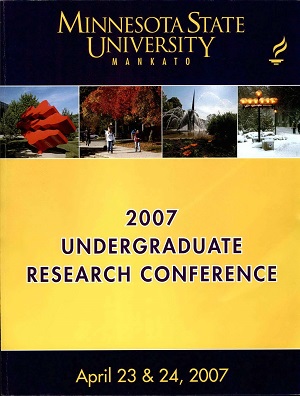Does Maternal Aldosterone Regulate Placental 11-Beta Hydroxysteroid Dehydrogenase Expression in Rats?
Location
CSU 253/4/5
Start Date
23-4-2007 1:00 PM
End Date
23-4-2007 3:00 PM
Student's Major
Chemistry and Geology
Student's College
Science, Engineering and Technology
Mentor's Name
Theresa Salerno
Mentor's Department
Chemistry and Geology
Mentor's College
Science, Engineering and Technology
Second Mentor's Name
James Rife
Second Mentor's Department
Chemistry and Geology
Second Mentor's College
Science, Engineering and Technology
Third Mentor's Name
Penny Knoblich
Third Mentor's Deparment
Biological Sciences
Third Mentor's College
Science, Engineering and Technology
Description
The aim of this project was to investigate whether maternal aidosterone levels regulate the expression of 11- beta hydroxysteroid dehydrogenase (11-pHSD) in the rat placenta. Two isoforms of this enzyme, 11-pHSD type I and type n, have been reported. It has been proposed that in the placenta, these enzymes protect the fetus from the maternal glucocorticoids. The purpose of this project was to measure the levels of 11-pHSD type I and type n mRNAs in the placenta of rats which have different maternal aidosterone levels. In this project, one set of rats had their adrenal medulla, the aidosterone producing layer, destroyed by freezing. The control group of rats had a sham operation. These surgeries were performed by Dr. Knoblich's research group. Placenta from both pregnant experimental and control Wistar-Kyoto (WKY) and Spontaneously Hypertensive rats (SHR) were collected and frozen in liquid nitrogen at day 21 of term. RNA was isolated from the placenta and was used to synthesize cDNAs using RT-PCR. Selective PGR primers were used to specifically amplify each of the two isoenzyme cDNAs in separate experiments. PCR products were quantified relative to an internal standard 18S RNA. The method was optimized to obtain similar amounts of internal standard and 11-pHSD cDNAs in the linear range of the amplification curves.
Does Maternal Aldosterone Regulate Placental 11-Beta Hydroxysteroid Dehydrogenase Expression in Rats?
CSU 253/4/5
The aim of this project was to investigate whether maternal aidosterone levels regulate the expression of 11- beta hydroxysteroid dehydrogenase (11-pHSD) in the rat placenta. Two isoforms of this enzyme, 11-pHSD type I and type n, have been reported. It has been proposed that in the placenta, these enzymes protect the fetus from the maternal glucocorticoids. The purpose of this project was to measure the levels of 11-pHSD type I and type n mRNAs in the placenta of rats which have different maternal aidosterone levels. In this project, one set of rats had their adrenal medulla, the aidosterone producing layer, destroyed by freezing. The control group of rats had a sham operation. These surgeries were performed by Dr. Knoblich's research group. Placenta from both pregnant experimental and control Wistar-Kyoto (WKY) and Spontaneously Hypertensive rats (SHR) were collected and frozen in liquid nitrogen at day 21 of term. RNA was isolated from the placenta and was used to synthesize cDNAs using RT-PCR. Selective PGR primers were used to specifically amplify each of the two isoenzyme cDNAs in separate experiments. PCR products were quantified relative to an internal standard 18S RNA. The method was optimized to obtain similar amounts of internal standard and 11-pHSD cDNAs in the linear range of the amplification curves.
Recommended Citation
Achu, Emmanuel and Justin Rocheleau. "Does Maternal Aldosterone Regulate Placental 11-Beta Hydroxysteroid Dehydrogenase Expression in Rats?." Undergraduate Research Symposium, Mankato, MN, April 23, 2007.
https://cornerstone.lib.mnsu.edu/urs/2007/poster-session-B/5




